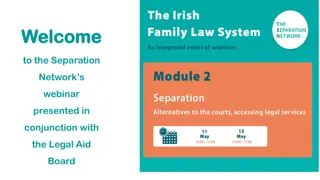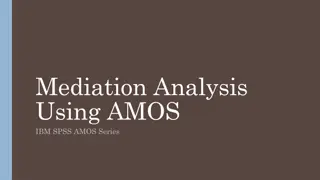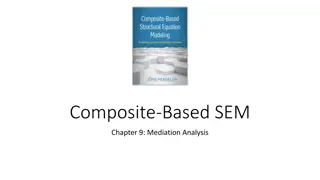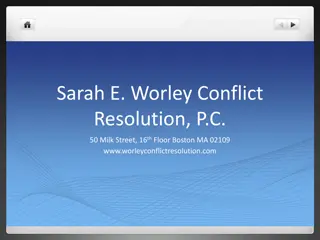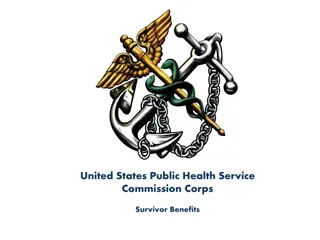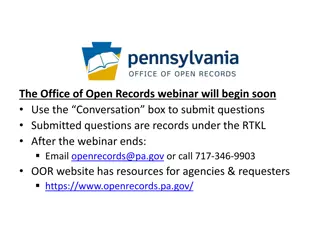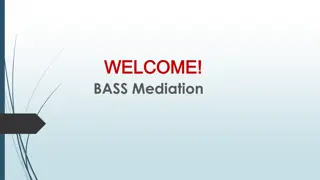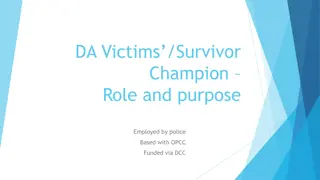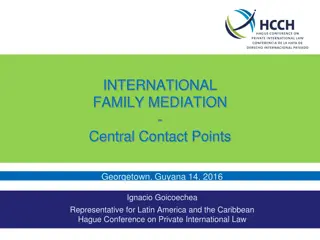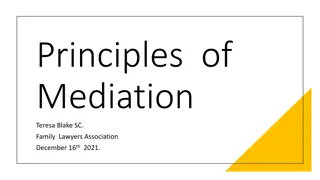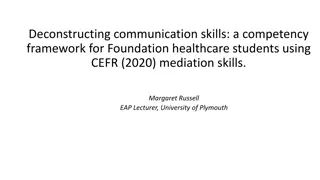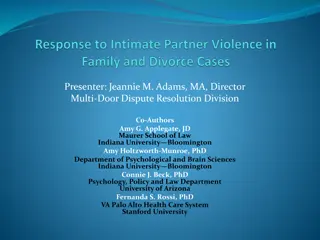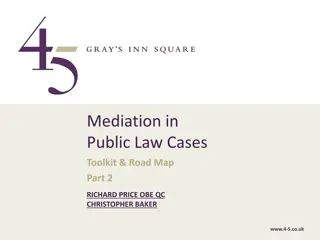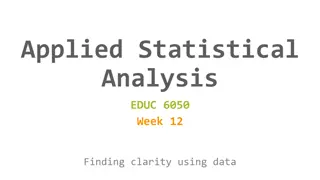Linguistic and Cultural Mediation for Survivor Support
This content covers Psychological First Aid (PFA) principles, preparation tips, survivor assessment techniques, and service linking strategies to assist survivors effectively. It emphasizes providing practical care, assessing needs, offering comfort, and facilitating access to support services while respecting survivors' needs and concerns.
Download Presentation

Please find below an Image/Link to download the presentation.
The content on the website is provided AS IS for your information and personal use only. It may not be sold, licensed, or shared on other websites without obtaining consent from the author.If you encounter any issues during the download, it is possible that the publisher has removed the file from their server.
You are allowed to download the files provided on this website for personal or commercial use, subject to the condition that they are used lawfully. All files are the property of their respective owners.
The content on the website is provided AS IS for your information and personal use only. It may not be sold, licensed, or shared on other websites without obtaining consent from the author.
E N D
Presentation Transcript
4 Bringing it all together: Linguistic and cultural mediation to support survivors
Psychological first aid (PFA): definition PFA describes a humane, supportive response to a fellow human being who is suffering and who may need support. PFA involves the following: providing practical care and support, which is not intrusive assessing needs and concerns helping people to address their own basic needs (for example, for food, water or information) listening to people, but not pressuring them to talk comforting people and helping them to feel calm helping people connect to information, services and social supports protecting people from further harm. 2 Module 4
Psychological first aid (PFA) approach Prepare: be aware of existing services Look Listen Link 3 Module 4
Prepare Understand the possible issues in the context where you work. Who are the vulnerable groups? What kind of violence and discrimination have they faced? Identify the good-quality services and support that are available for the referral of survivors of all genders and sexualities, including women, girls, men, boys and LGBTQI+ people (check with your supervisor for approved places). Identify any specific security and protection needs. 4 Module 4
Look Check that the survivor is safe at the moment (with no physical injuries, etc.). Check for any signs of shock, such as sweating, pale or blueish skin and lips, confusion, or fast breathing. Provide a blanket, a glass of water and anything else they need to help them get comfortable. 5 Module 4
Listen Move closer to the survivor so that you can hear them well. Listen to them and try to help them to calm down with deep breathing, suggesting they drink some water, etc. Do not ask for details about the violence they have experienced that is not your concern. Listen to the needs and concerns that they choose to express. Reassure them with healing statements. 6 Module 4
Link (to services) Help the survivor find services that can meet their basic needs, if that is what they want. Help the survivor find others who can help them deal with their problems, if that is what they want. Provide them with information about existing services in the area. If the survivor consents, make a referral. 7 Module 4
The priority of consent The survivor has the right to: understand what you are proposing comprehend the consequences of the actions refuse your proposal No decision about a survivor's life can be taken by the LCM without the survivor's informed and explicit consent. 8 Module 4
A healing statement Thank you for telling me. Builds relationship You are very brave for telling me Validates and empowers Builds trust I believe you. What happened was not your fault. Reassurance and non-blaming Expresses empathy I am sorry this happened to you. 9 Module 4
Recap Through the psychological first aid (PFA) approach everyone can support the recovery process of a survivor who discloses violence. The four steps of PFA are: Prepare Look Listen Link In this context, it is particular important to use healing statements' when interacting with the survivor. 10 Module 4
Case Study of Omid and Azar: Handling disclosure of violence Module 4 11
Recap Every individual has a right to make their own decisions and it s up to them whether to share something with us or not. LCMs have to respect a survivor s will, even if they are younger, vulnerable or less experienced. Teamwork is key, particularly when dealing with complex cases, and it is important to ask for help from colleagues. 12 Module 4
Case study of Omid and Azar: Collaborating with other professionals in the support process Module 4 13
Collaborating with other professionals Being aware of the duties and responsibilities of every member of the team Clarity of tasks Mutual recognition of roles 14 Module 4
Negative practices These are often the result of contextual factors, for example: We work in an emergency and there is very limited time for preparation when supporting service provision. There are no regular meetings for discussing stressful situations, difficult experiences or complex cases. 15 Module 4
Negative practices These are also shaped by personal characteristics: If the LCM does not believe in the organization's mission. If there is a lack of respect for each other's professional roles and competencies (among team members). If LCMs or service providers are not aware of their own attitudes and beliefs and how they impact service provision. If the LCM or others use their power inappropriately when assisting individual people and/or their community (e.g. for personal benefit or on the basis of religious, cultural and traditional convictions). 16 Module 4
What else can hinder a good collaboration? If LCMs don t find a balance between their different roles. If one or more members of the team do not recognize or understand the role of the LCM. If the team doesn t share experiences and learn together. 17 Module 4
Positive practices that enhance collaboration Respect the role and the competencies of your colleagues in a reciprocal way. Make it a habit to have brief sessions with the service provider you support as an LCM before and after consultations/interviews to clarify the common direction and objective when supporting a survivor. Discuss with the rest of the team any aspects of a case that make you feel uncomfortable and that make you doubt the appropriateness of your response or theirs (while maintaining confidentiality). 18 Module 4
Recap A good collaboration between service providers and LCMs is essential. Clarifying roles and responsibilities in advance is useful to avoid any confusion. LCMs should help others to understand their role as well as the limits around that role. The professional role of the service provider (doctor, nurse, social worker, psychologist) must always be respected. Good teamwork will provide a better service to clients, as well as a more supportive environment for the members of the team itself. LCMs should always remember the risks around vocabulary and the negative connotations of certain words. LCMs should also remember to practice active listening skills and be aware of body language. 19 Module 4
Case study of Omid and Azar: Self-awareness Module 4 20
Guidelines and rules of conduct DOs DON Ts Introduce yourself and explain your role. Accurately interpret everything that is said, without skipping anything. I m telling you this but please don t translate it is not acceptable. Do not accept assignments for which you know you are unqualified or not prepared. Do interpret words (and attitudes) in each language, and explain cultural differences or practices as needed. Interpret the word used by the client in the most literal way, followed by a short explanation to the service provider about why you have used that term (for example, if it has a negative connotation). Do not take assignments if you risk being biased or if there is a conflict of interest (e.g., a family member or a close friend is involved). Do give additional support, as well as conveying information if requested. For example, you can help to fill out forms. Do not repeat what you have heard to friends, relatives, or anyone else. Do correct yourself if you make a mistake, and always ask for clarification if there is something you don t understand. Do not use your position to exercise power over or pressure any speaker or listener. 21 Module 4
Guidelines and rules of conduct DOs DON Ts Do respond to racist or abusive language from a service provider by highlighting its offensiveness with the speaker and checking if that is what they want to say before interpreting it. Report their behaviour to their supervisor afterwards. Do not use your position to gain favours, including financial ones, from any speaker or listener. Do not hold a separate conversation with one speaker without interpreting for the others. Do use all available resources, like glossaries or reference material, to improve your understanding and knowledge. Do not comment on what you interpret or answer a question on behalf of one of the speakers. Do ensure that your appearance is appropriate and adapted to the context (decent and neutral). Do not show your feelings or express your opinion. It is important to remain neutral. 22 Module 4
Recap Asking to repeat a concept that we are not sure about is better than interpreting in an incorrect manner. Being aware of body language is important during linguistic and cultural mediation. Always remember the dangers that might occur as a result of stereotyping, the halo effect and selective perception. In certain cases, when the LCM understands that their attitudes and beliefs may jeopardize the effectiveness of service provision, it s better to explain the situation openly to the service provider and leave room for another mediator, whenever possible. 23 Module 4
Recap: the role of LCMs When language is involved, personal attitudes, beliefs and knowledge come into play. Becoming aware of this is essential for everyone's work, but particularly for LCMs and Interpreters. The LCM holds the 'power of words . Learning how to handle disclosure is the responsibility of all team members, including LCMs. LCMs often become the focal points for clients or communities, whether this is officially part of their work or not. The role of the LCM is complex and mutual understanding of roles and responsibilities is necessary for a good teamwork. Practicing PFA and a survivor-centred approach are key to supporting a survivor. 24 Module 4





